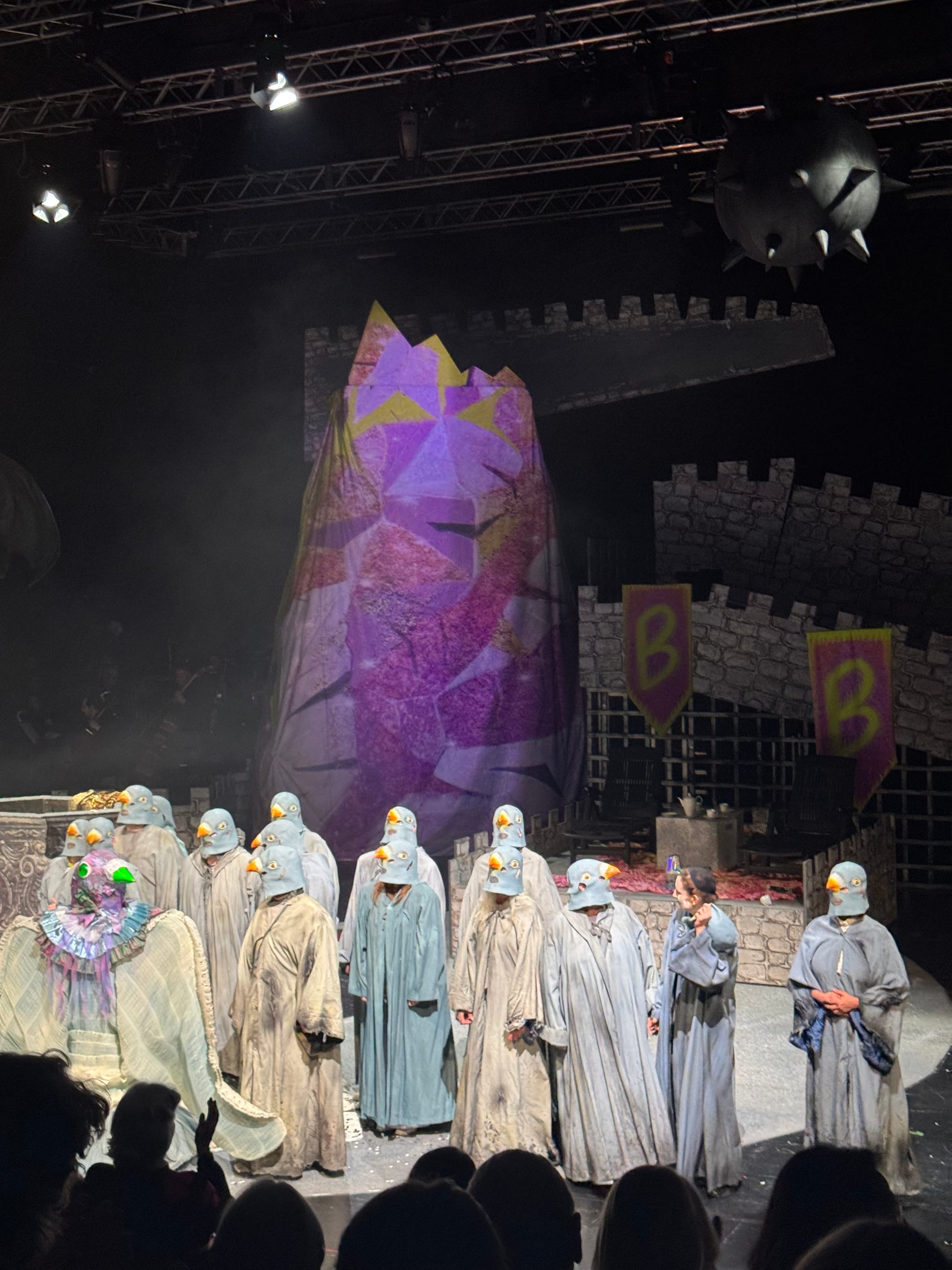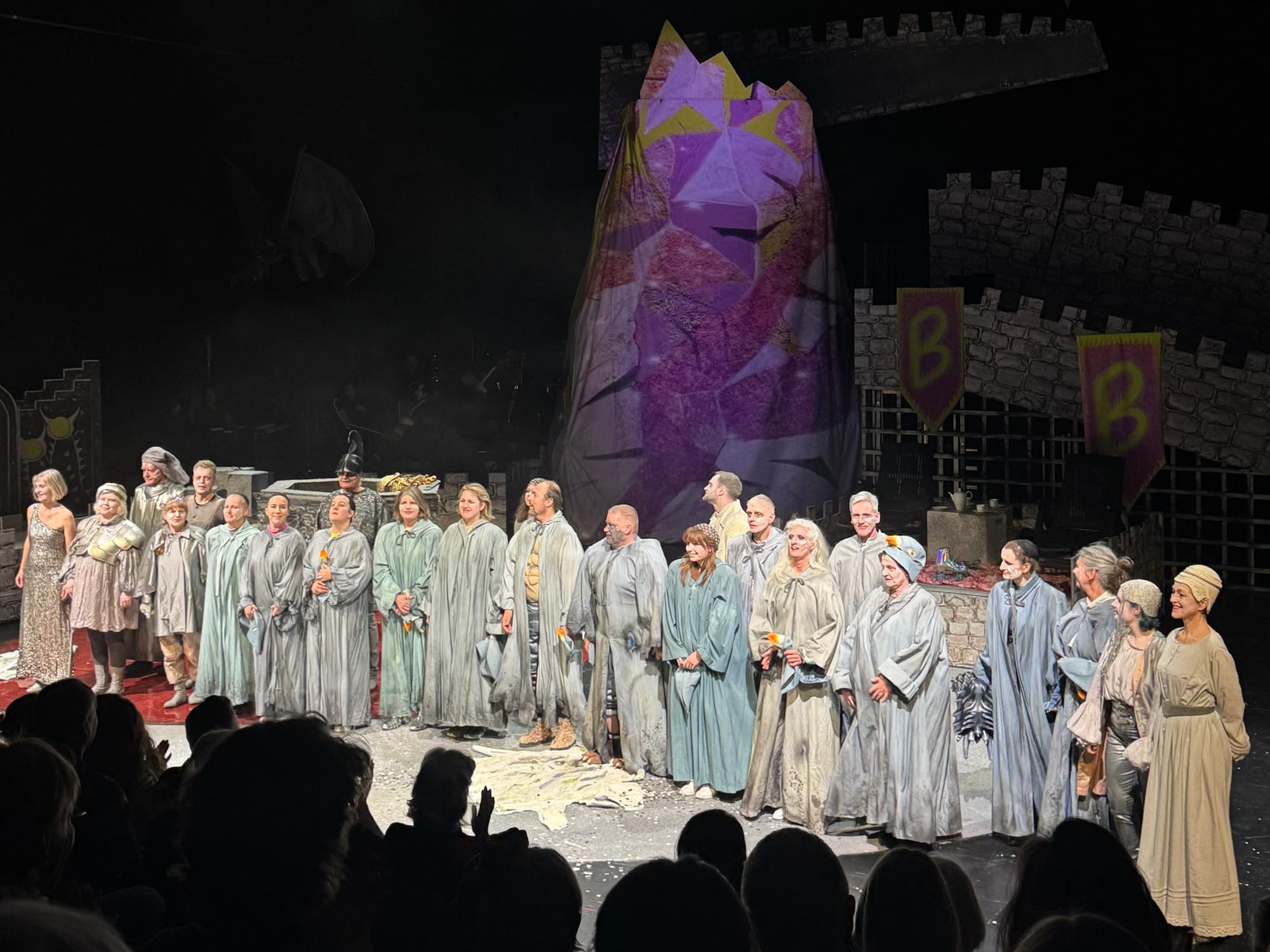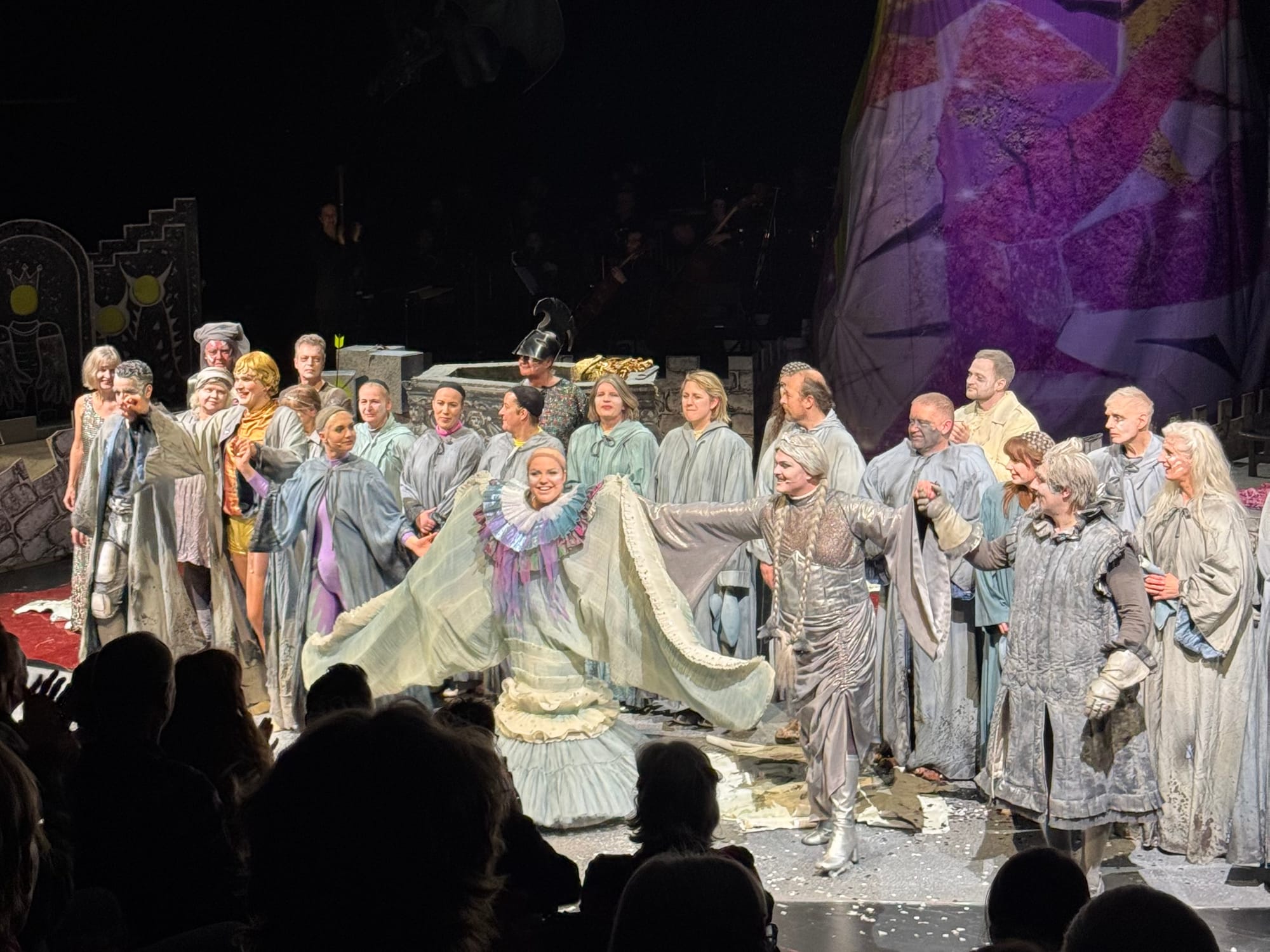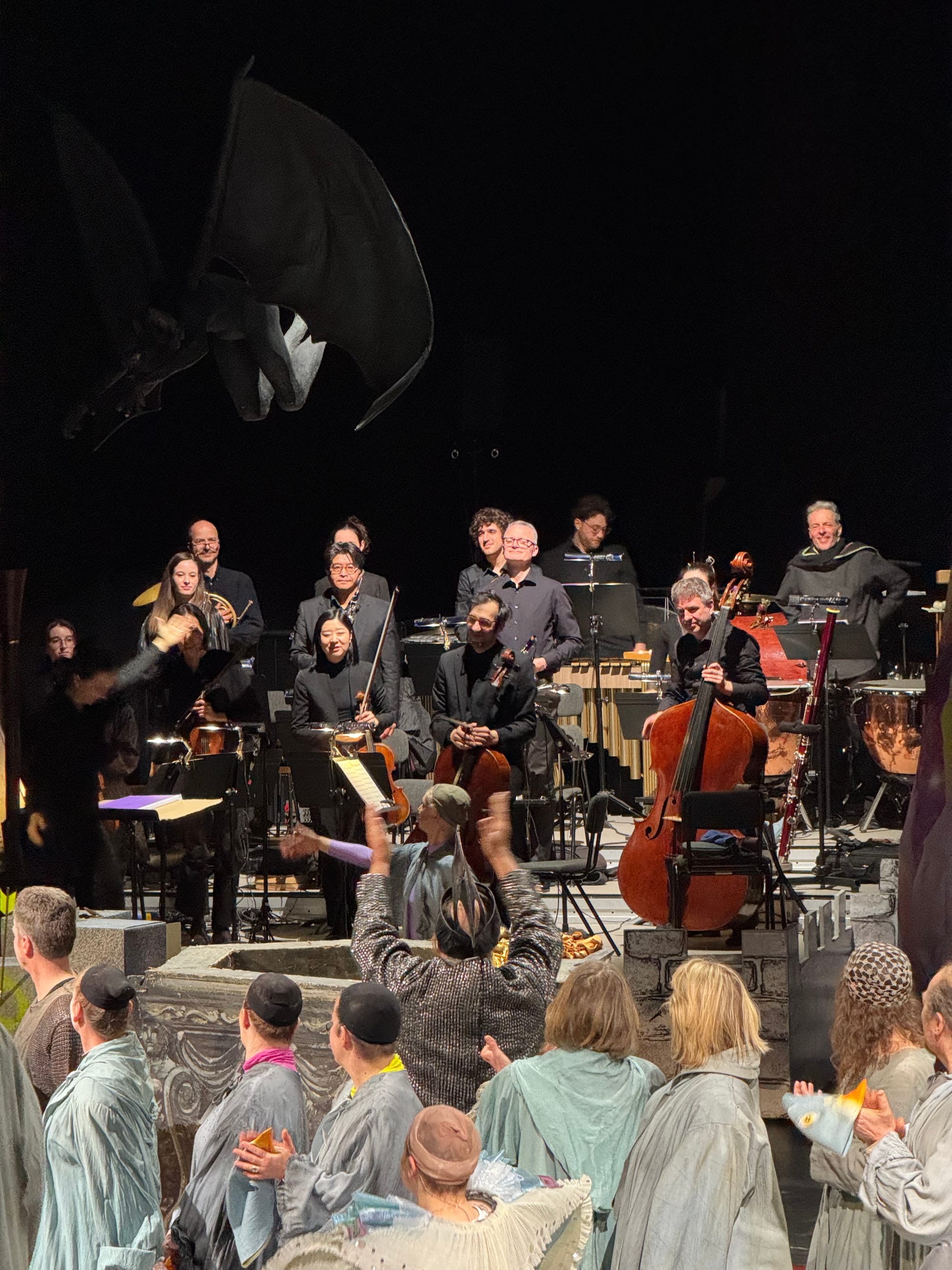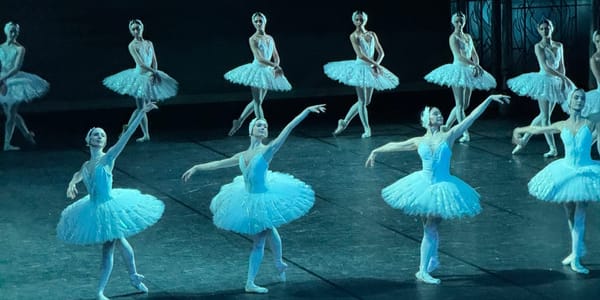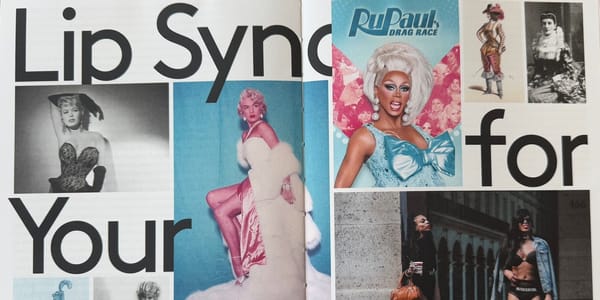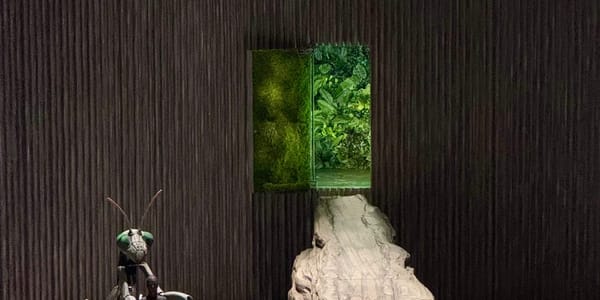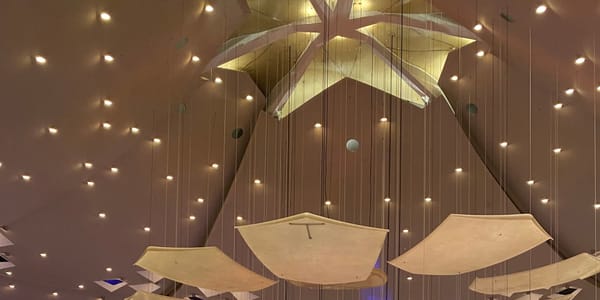Ab in den Ring! at Deutsche Oper Berlin (Tischlerei)
Tutti d*amore succeeds in repurposing a century-old operetta for a contemporary audience while making a strong case for operetta as a modern vehicle for social commentary.

⭐️⭐️/4
🎭 Ab in den Ring!
🎶 Felix Stachelhaus / Oscar Straus
💭 tutti d*amore, 2025
🏛️ Tischlerei @ Deutsche Oper Berlin
🗓️ 06.03.2025
“DIESES HAUS MUSS DOCH NICHT FÜR ALLE SEIN!”
AB IN DEN RING! is a production by the Berlin artist collective tutti d*amore for the Tischlerei, the smaller stage of the Deutsche Oper Berlin. At first glance, this modern operetta appears camp, gaudy, and chaotic, but beneath the surface, it reveals itself as a sharp critique of Berlin’s contemporary cultural scene—institutional opera and alternative arts alike—as well as a commentary on a city government imposing austerity policies on both.
In short
At its core, the production seeks to prove that operetta remains a relevant and legitimate art form in an era dominated by fast-paced video feeds and AI-generated content. By doing so, it aims to introduce the genre to audiences who may never have engaged with opera or operetta before. But AB IN DEN RING! goes beyond the approach of modern repertoire opera productions, which often reinterpret classic works within the constraints of existing music and libretto. Instead, it takes the source material, reworking the characters, adapting the plot and text, and merging the original score with modern pop and rap influences. The result is a thoroughly modern operetta—one that references contemporary pop-cultural phenomena, responds to current events, and ultimately offers a more immediately relatable experience than many conventional opera productions (despite the ingenuity of some contemporary directors in stretching opera to fit completely new narratives).
Historical context
To fully appreciate the piece’s effectiveness as sociopolitical satire, it’s helpful to examine its source material and historical context. The production is based on DIE LUSTIGEN NIBELUNGEN, an operetta by Oscar Straus that premiered in 1904 in Vienna. At the time, the German imperial nation state was at its cultural and political height—only a decade away from its collapse in the wake of World War I. As part of the national identity-building process following German unification in 1871, there was a surge of enthusiasm for Germanic mythology, particularly the NIBELUNGENLIED. This medieval epic, brimming with legendary heroes, became a projection surface for burgeoning national(ist) pride.
Straus’s operetta satirized this phenomenon, drawing inspiration from the French comedic operetta tradition of previous generations to poke fun at the nationalist fervor surrounding the Nibelungen legend. By placing Siegfried and his mythical companions in absurdly mundane settings and exaggerating their stories for comic effect, Straus mocked both the cultural obsession with these myths and the imperial elite. Unsurprisingly, the operetta faced hostility from nationalist circles and was even banned under the Third Reich—a reminder of how art, protest, and censorship are deeply intertwined.

Contemporary context
Tutti d*amore retains the essence of this satire while giving it a new, urgent context. In AB IN DEN RING!, the Nibelungen are reimagined as a dysfunctional but loving family running the Deutsche Oper Berlin. The operetta’s central conflict is no longer about mythical heroism but about the struggle between "high" culture and "sub"culture in the face of severe state budget cuts—an all-too-real concern, given that the conservative-led Berlin government has announced that the city’s cultural institutions must save hundreds of millions of euros in the coming years. This is not just an abstract political issue; it’s an existential threat to Berlin’s identity. Without its opera houses, clubs, museums, and alternative arts scene, Berlin risks becoming culturally barren. Tourists don’t flock to the city for its architecture, urban planning, or cuisine—they come for its rich artistic history, its symphonic orchestras, and its internationally celebrated clubs. Undoubtedly, both "high" and "sub"culture contribute to the artistic reputation that Berlin has gained in the past decades.
The production
Back to AB IN DEN RING!, which presents this crisis through an absurd yet unsettlingly plausible premise: The Berlin Senate has once again slashed arts funding and has decided to merge established cultural institutions with the alternative arts scene to cut costs. The Deutsche Oper is therefore forced into a merger with the "Wilde Brünhilde", a radical performance collective determined to dismantle the elitist Wagnerian opera house. In a desperate attempt to prevent this fate, the opera house’s managing family resurrects their hero, Siegfried—who has been entombed in the opera’s stage-set warehouse—hoping to marry him into their family and secure his legendary Nibelungen wealth. Siegfried’s mission? To “defeat” Brünhilde and save the opera house. What follows is a chaotic clash of artistic ideologies, an unraveling family dynamic, and romantic entanglements in multiple character constellations.
The satire here is sharp and multifaceted, and is directed at "high" and "sub"culture in equal measure. The opera world is skewered for its rigid hierarchy and patriarchal power dynamics (“Ich bin der Intendant” / “Ein Intendant macht sich die Hände nicht schmutzig”), its often illogical plotlines (“Kriemhild kann doch keinen Mythos heiraten?” / “Doch, wir sind schließlich in der Oper!”), and its overall perception of being elitist and inaccessibile. Meanwhile, the alternative arts scene is parodied for its ideological rigidity, its fixation on identity-based collectives (“unser neu gegründetes Netzwerk”), its use of gender-inclusive language (“Amazonen:innen”), and its insistence for radical disruption over negotiated compromise. The satire extends to German politics as well, echoing mainstream narratives that vilify the Green Party, the state’s failure to provide affordable housing, and—most pointedly—the harsh reality of cultural budget cuts. When a character asks whether the Komische Oper still exists (a nod to its real-life existential crisis due to budget cuts last year), the audience’s laughter is uneasy, at best—such is the dire state of Berlin’s cultural funding, and so are we reminded of the real stakes at play.
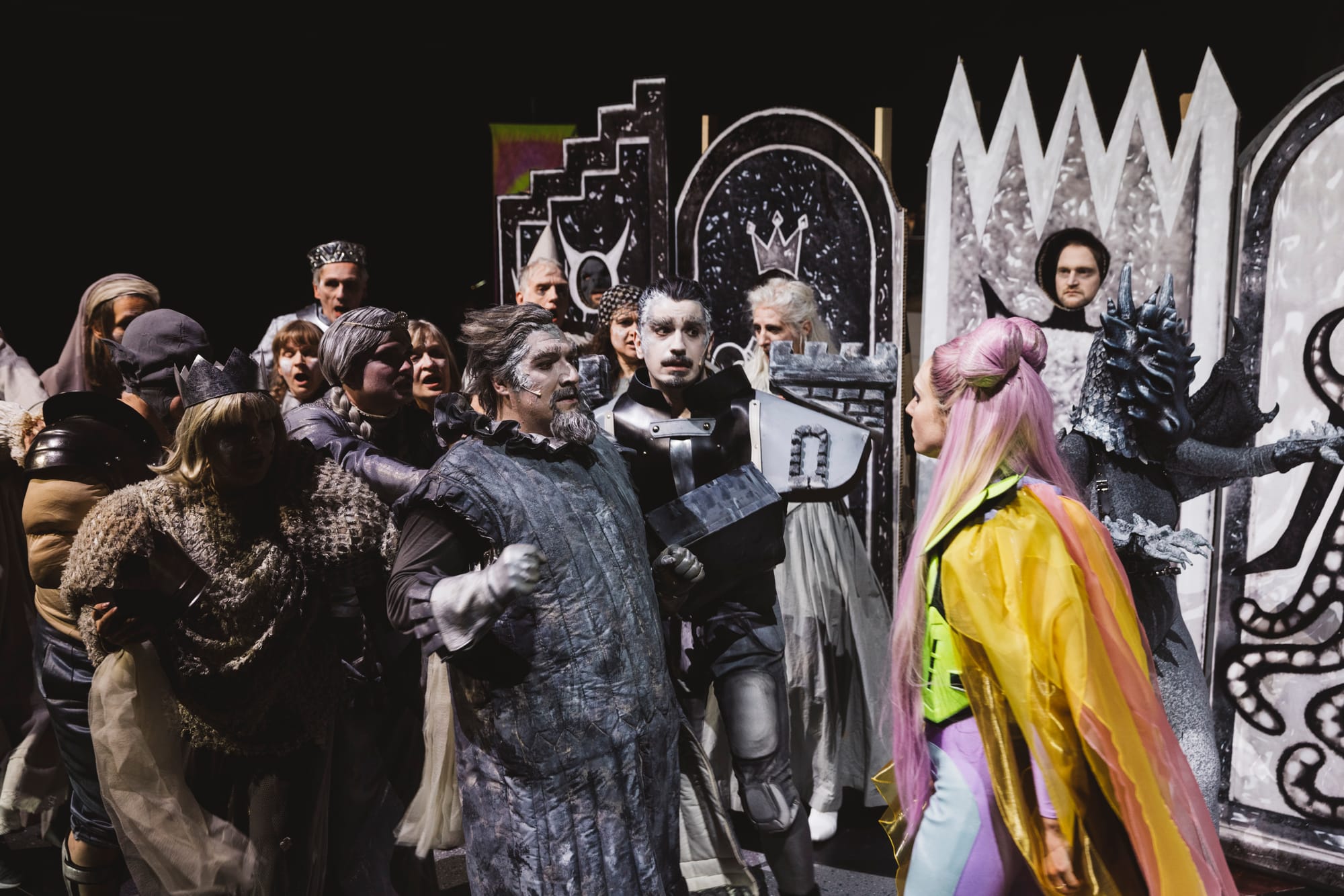
A queer operetta
The production is also unapologetically queer. Kriemhild, a soprano role in the original operetta, is played by a tenor in full "drag". Siegfried, dressed in golden tights, exudes gaudy “Rocky Horror” camp, and homoerotic undertones permeate the story. The most striking departure from the original operetta comes in Siegfried’s love story: instead of ending up with Kriemhild, he falls for Hagen. The story culminates in a steamy make-out session after Hagen's attempted murder of Siegfried fails—this storyline diverging from the medieval source in more ways than one. This creative decision not only reworks the narrative but also highlights how societal perceptions of gender and sexuality shape our interpretations of art. Historically, gender-bent casting was commonplace in opera—sometimes out of necessity, in contexts where women were barred from performing publicly. Today, however, such casting inherently carries queer connotations because it deviates from cis-heteronormative expectations. In a time when cultural debates over gender and sexuality are increasingly polarized, AB IN DEN RING! is one of many artistic works pushing for a more progressive, inclusive, and normalizing vision.
The music
Musically, the production stays surprisingly faithful to Straus’s original composition. Even Brünhilde’s modernized, rap-infused numbers retain the cadence and rhythm of the source material. Initially, I left the performance convinced by its intent and message but unsure whether the music itself would leave a lasting impression. However, after revisiting a recording of the original DIE LUSTIGEN NIBELUNGEN, I have to acknowledge that the composition is full of bangers—mostly catchy waltzes—and even includes nods to Wagner’s own music (there’s a reason one of the characters refers to him as “our hero”). The production leans into this musical lineage right from the start, even (politely) forcing the audience to stand and sing an adapted chorus from Wagner’s TANNHÄUSER.
Outlook
In the end, AB IN DEN RING! delivers a clever, biting critique of both elite high culture and radical subculture, highlighting the often unnecessary tensions between the two. Tutti d*amore succeeds in repurposing a century-old operetta for a contemporary audience while making a strong case for operetta as a modern vehicle for social commentary. Still, there remains an inherent tension between its stated inclusivity and its implicit target audience. Many of its jokes require knowledge of Berlin’s political landscape, the Nibelungen myth, and opera traditions—knowledge that can certainly be expected in an operetta from Berliners, for Berliners. And yet, by offering only German-language supertitles, a significant portion of Berlin’s international creative community is left behind—something that the larger “elite” houses have addressed with multilingual supertitles. My English-speaking friend, who usually follows opera in German, Italian, and French with ease, struggled with this production. Perhaps Gunter’s proclamation was more self-aware than ironic after all: “Dieses Haus muss doch nicht für alle sein!”
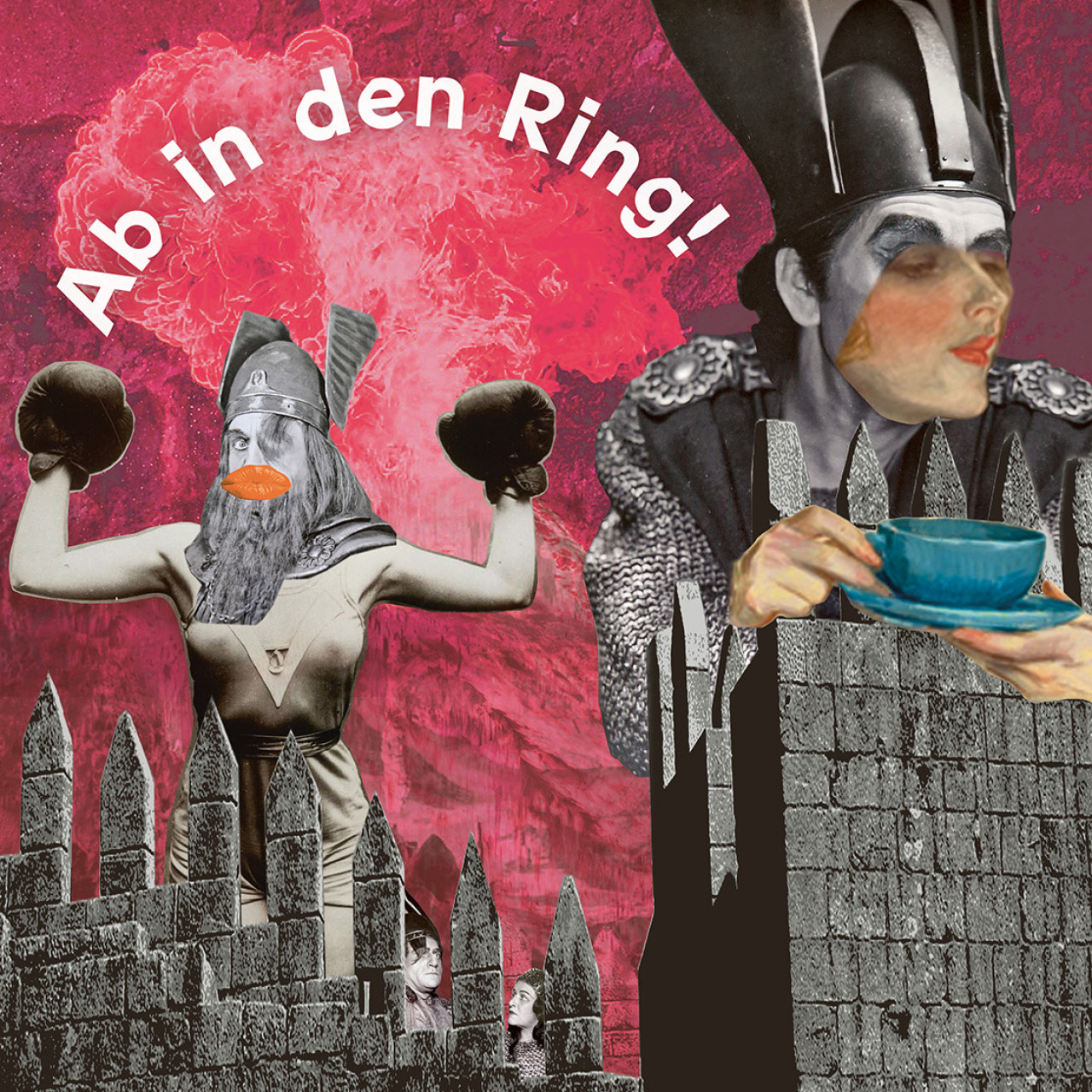

Cast
Artistic direction tutti d*amore
Musical adaption Felix Stachelhaus
Musical direction Elda Laro
Production Anna Weber
Stage, costume Stella Lennert
Dramaturgy Carolin Müller-Dohle
Direction Apollo-Choir Artur Just
Brünhilde / Ute Caroline Schnitzer
Siegfried Ferdinand Keller
Kriemhild Ludwig Obst
Giselher / Forest bird Evelina Smolina
Gunther Artur Garbas
Hagen Ferhat Baday
Choir Apollo-Choir at the Staatsoper Berlin
With Musicians of the orchestra of the Deutschen Oper Berlin
